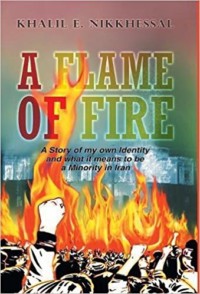Title: A Flame of Fire: A Story of My Own Identity and What It, Means to Be a Minority in Iran
Author: Khalil E. Nikkhessal
Publisher: Book Venture Publishing, LLC
Pages: 122
ISBN: 978-1-946735-60-7
Genre: Non-Fiction, Memoir
Reviewed by: Susan Brown
Pacific Book Review
Religious freedom is not something found the world over. It is particularly not evident in Iran where religious persecution takes place against the Bahá’í, the country’s second largest religion. What’s remarkable is so many in this minority group are successful in spite of the obstacles that come with this type of discrimination. Author Khalil Nikkhessal is one such example. By his own admission, it just wasn’t very easy. A Flame of Fire is his story of perseverance.
Mr. Nikkhessal was born in Yazd, Iran in 1941, into a family having a brother and three sisters. His understanding of his place in the country’s culture was formed early, from observing the treatment of the elders in his family by the Muslim community and by the mistreatment he received in school. That did not deter him, however, from graduating from high school, immigrating to Germany, learning the language and ultimately receiving a master’s degree in electronics from the Technical University in Frankfurt. After a series of jobs in that country, he returned to Iran, his homeland, to establish a family and a business.
Interspersed in the narrative of Mr. Nikkhessal’s personal life, are insightful reflections of Iranian culture, chronicling historical milestones, as well as perspectives on the revolution, the Shah and the ongoing victimization of the Bahá’í. Yet, with all of the upheavals, Mr. Nikkhessal persevered, finding work as a self-employed electronics repairman, after being fired from a job because of his religious convictions. He went on to hire unemployed Bahá’ís and successfully built a business literally from the ground up out of a workshop in his parent’s house.
What transpires throughout his next 30 professional years is a series of business triumphs and, unfortunately, defeats. Mr. Nikkhessal captivates the reader with the innermost details of each business; the people, the work, the drama, the ups-and-downs and, perhaps most importantly, the impact to his body, mind and spirit which ultimately drove him to leave his beloved birthplace and relocate to the United States with his wife.
What comes shining through in this memoir is the author’s optimism. Early on he sets the tone for his perspective by writing, “However, we should always take the lessons of our past, good or bad, into the future. Success requires self-confidence, intelligence, and good circumstances. These things can be found in any situation if one is willing to work.” At the end of this story, that optimism is still a part of the narrative. He says, “When you carried your memories, you would bend your back under them. However, if you put them under your foot, your height will be taller. I, at this moment, bring it out of my heart one after another and put it under my foot to forget them all.”
Marginalized people the world over face enormous difficulties in daily life. Understanding these struggles enhances our compassion and empathy. This book is a teaching moment, a conduit to greater awareness of the biases faced by so many in different cultures thanks to the honest and sincere personal recollections shared by the author.



Follow Us